

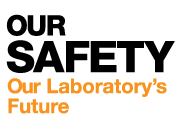
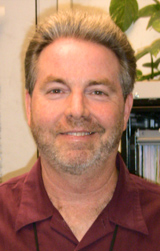
Taking a break is one of the best ways to help safety training sink in. Just ask Kevin Haugh, who is in charge of transportation, shipping, and receiving. Before leaving on vacation in December, he instructed his team to move a storage trailer off-site. But while driving off for his trip, “I thought about my asbestos-awareness training and realized it was an old trailer.” He stopped his car, called his team and told them not to move the trailer.
The Industrial Hygiene Group inspected the trailer, discovering lead paint and asbestos. Haugh’s quick thinking saved the Lab from “a huge violation” costing the Lab thousands of dollars and its reputation. Haugh credits his team and the Lab’s safety training, which works best “if you’re able to focus with a clear mind.” Share how you implement safety in your work area here.
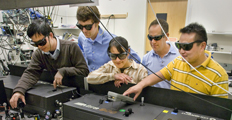 Research: Nanocrystals Reveal Activity Within Cells
Research: Nanocrystals Reveal Activity Within Cells Berkeley Lab researchers led by Bruce Cohen, Jim Schuck and Delia Milliron of the Molecular Foundry, have demonstrated that bright, stable and bio-friendly nanocrystal probes can act as individual investigators of activities within a biological cell. These ideal light emitting probes represent a significant step in scrutinizing the behaviors of proteins and other cellular components. More>
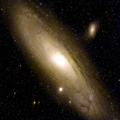 Research: Palomar and NERSC Join Forces to Find Fleeting Cosmic Objects
Research: Palomar and NERSC Join Forces to Find Fleeting Cosmic Objects Finding rare and fleeting cosmic events not only requires the right kind of telescope and camera, it depends on high-performance computing that can pinpoint objects of interest among thousands of sky images while there’s still time for follow-up observations. Caltech and NERSC have joined forces in just such a search, the Palomar Transient Factory. The factory will utilize unique tools to expose relatively rare and fleeting cosmic events, like supernovae and gamma ray bursts. More>
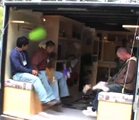 Video Feature: The Sights and Sounds of Emergency Preparedness Week
Video Feature: The Sights and Sounds of Emergency Preparedness Week Last week the Lab sponsored numerous activities to raise awareness of what it takes to be prepared for an emergency, be it a fire, earthquake, or health crisis. Among the events was a fair — during which participants sat in a “shake” trailer to experience what an earthquake feels like (pictured), or tasted samples of emergency food — a rescue dog demonstration, and a drop-cover-hold-on drill. These activities were captured on video by Lab photographer Roy Kaltschmidt, with the Creative Services Office.
Researchers and administrators who want to learn more about export control regulations, and avoid possible civil or criminal liability due to lack of compliance, are invited to a talk by Donald Fischer, an expert in this area. Two sessions will be held tomorrow in Perseverance Hall (Bldg. 54-130), one from 10:30 a.m. to noon and the other from 2 to 3:30 p.m. Training in this area is critical due to strict enforcement by the U.S. government. Send e-mail here to register. Go here for more information.
The Lab has new outgoing e-mail settings. Those who send e-mail from offsite, such as home, on travel, or use the Lab’s wireless network, must change their e-mail client to use the settings specified here. Note that the Lab’s wireless network is considered offsite, so those who use a laptop on this network need to make this change as well. These settings work at the Lab and offsite. To avoid disruption in sending e-mail, changes must be made by tomorrow.
Today at Berkeley Lab is produced by Public Affairs' Communications Department